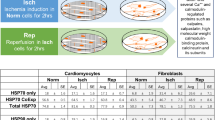Abstracts.
Heat shock proteins (hsp) represent a group of chaperones which protects the cells against a diversity of stresses. It has been demonstrated that hsp27 is constitutively present in cells where it plays an important role in different cytoprotective processes which ultimately inhibit cell death. We investigated the response of the isolated perfused mouse heart over expressing hsp27 to the ischaemia/reperfusion injury using infarct size as an end point. Our results show for the first time that mice over expressing hsp27 (verified by Western blotting analysis) were found to be protected from lethal ischaemia/reperfusion injury compared to their negative littermates.
Similar content being viewed by others
References
Akbar MT, Lundberg AMC, Liu K, Vidyadaran S, Wells KE, Dolatshad H, Wynn S, Wells DJ, Latchman DS, de Belleroche J (2003) The neuroprotective effects of heat shock protein 27 overexpression in transgenic animals against Kainate-induced seizures and hippocampal cell death. Journal of Biological Chemistry 278:19956–19965
Bell RM, Yellon DM (2003) Atorvastatin, administered at the onset of reperfusion, and independent of lipid lowering, protects the myocardium by up-regulating a pro-survival pathway. J Am Coll Cardiol 41:508–515
Brar BS, Stephanou AS, Wagstaff MJD, Coffin RS, Marber MS, Engelman G, Latchman DS (1999) Heat shock proteins delivered with a virus vector can protect cardiac cells against apoptosis as well as against thermal or ischaemic stress. Journal of Molecular and Cellular Cardiology 31:135–146
Chi NC, Karliner JS (2004) Molecular determinants of responses to myocardial ischaemia/reperfusion injury: focus on hypoxya-inducible and heat shock factors. Cardiovasc Res 61:437–447
Heads RJ, Latchman DS, Yellon DM (1994) Stable high level expression of a transfected human HSP70 gene protects a heart-derived muscle cell line against thermal stress. Journal of Molecular and Cellular Cardiology 26:695–699
Heads RJ, Yellon DM, Latchman DS (1995) Differential cytoprotection against heat stress or hypoxia following expression of specific stress protein genes in myogenic cells. Journal of Molecular and Cellular Cardiology 27:1669–1678
Hollander JM, Martin JL, Belke DD, Scott BT, Dillmann WH (2003) Transgenic overexpression of wild type hsp27 and a hsp27 nonphosphorylatable mutant protects against ischaemia/reperfusion injury. Circulation (supplement) 108:abst 431
Kalwy S, Akbar MT, Coffin S, de Belleroche J, Latchman DS (2003) Heat shock protein 27 delivered via a herpes simplex virus vector can protect neurones of the hippocampus against kainic acidinduced cell loss. Molecular Brain Research 111:91–103
Latchman DS (2001) Heat shock proteins and cardiac protection. Cardiovascular Research 51:637–646
Latchman DS (2003) Protective effect of heat shock proteins: potential for gene therapy. Gene Therapy and Molecular Biology 7:245–254
Lau S, Patnaik N, Sayen RS, Mestril R (1997) Simultaneous overexpression of two stress proteins in rat cardiomyocytes and myogenic cells confers protection against ischaemia-induced injury. Circulation 96:2287–2294
Lee JE, Yenari MA, Sun GH, Xu L, Emond MR, Cheng D, Steinberg GK, Giffard RG (2001) Differential neuroprotection from human heat shock protein 70 overexpression in in vitro and in vivo models of ischaemia and ischaemia-like conditions. Experimental Neurology 170:129–139
Marber MS, Walker JM, Latchman DS, Yellon DM (1994) Myocardial protection following whole body heat stress in the rabbit is dependent on metabolic substrate and is related to the amount of the inducible 70kb Dalton heat shock protein. Journal of Clinical Investigation 93:1087–1094
Mestril R, Giordano FJ, Conde AG, Dillmann WH (1996) Adenovirus-mediated gene transfer of a heat shockprotein 70 (hsp70i) protects against simulated ischaemia. JMCC 28:2351–2358
Murashov AK, Ul Haq I, Hill C, Park E, Smith M, Wang X, Wang X, Goldberg DJ, Wolgemuth DJ (2001) Crosstalk between p38, Hsp25 and Akt in spinal motor neurons after sciatic nerve injury. Brain Res Mol Brain Res 93(2):199–208
Plumier JCL, Ross BM, Currie RW, Angelidis CE, Kazlaris H, Kollias G, Pagoulatos GN (1995) Transgenic mice expressing the human heat shock protein 70 have improved postischaemic myocardial recovery. Journal of Clinical Investigation 95:1854–1860
Rane MJ, Pan Y, Singh S, Powel DW, Wu R, Cummins T, Chen Q, McLeish KR, Klein JB (2003) Heat shock protein 27 controls apoptosis by regulating Akt activation. Journal Biological Chemistry 278, 30:27828–27835
Author information
Authors and Affiliations
Corresponding author
Rights and permissions
About this article
Cite this article
Efthymiou, C.A., Mocanu, M.M., de Belleroche, J. et al. Heat shock protein 27 protects the heart against myocardial infarction. Basic Res Cardiol 99, 392–394 (2004). https://doi.org/10.1007/s00395-004-0483-6
Received:
Revised:
Accepted:
Published:
Issue Date:
DOI: https://doi.org/10.1007/s00395-004-0483-6




